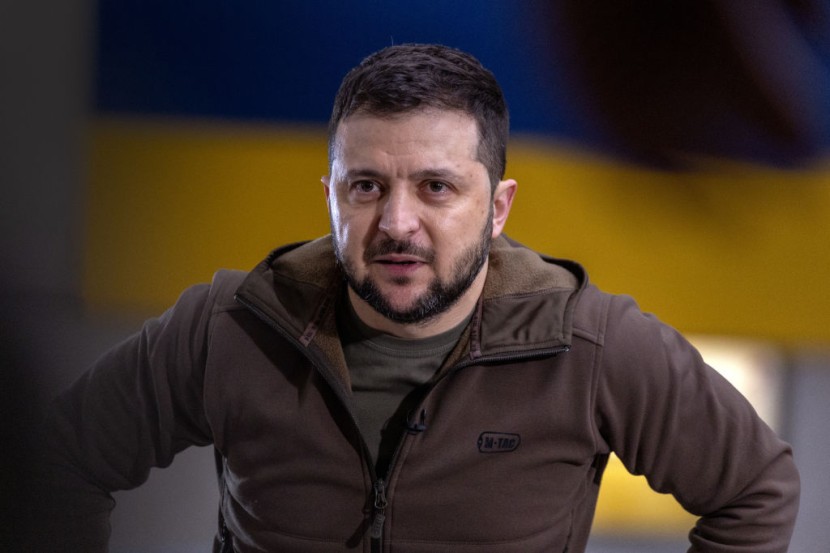
The Biden administration is in a stalemate with Germany on whether to send tanks to Ukraine in advance of Friday's crucial meeting of Western defense ministers in Germany.
In recent days, German officials have indicated they will not send their Leopard tanks to Ukraine, nor will they allow any other country with the German-made tanks to do so unless the United States also agrees to send its M1 Abrams tanks to Kyiv - something the Pentagon has stated for months it has no intention of doing because of the logistical costs associated with maintaining them.
Ukraine Urges For More Tanks
"They have us cornered," a senior Biden administration source told CNN on Thursday, adding that the Germans are demanding tanks in exchange for the Leopards and are refusing to consider any other offers the United States has made.
The tank standoff is occurring in the context of a far bigger discussion between the United States and its European allies about whether to supply Ukraine with increasingly advanced weaponry, including longer-range missiles that would allow Ukraine to strike targets up to 200 miles away.
The United Kingdom, Poland, Finland, and the Baltic nations have all advocated for NATO allies to supply heavier armaments to Kyiv at a crucial turning point in the conflict. There are indications that both Ukraine and Russia are preparing for new offensives, and that Moscow may be contemplating an extra mobilization of troops.
The British increased the pressure on their Western friends by announcing the shipment of fourteen Challenger tanks to Ukraine last week. On Wednesday, though, Germany and the United States remained opposed to the notion of sending their own tanks.
The German government then drew the Biden administration further into the impasse by indicating that the supply of tanks was reliant on the United States doing the same.
In an apparent weakening of Germany's position, German Defense Minister Boris Pistorius, who just entered his position this week, told The New York Times on Thursday evening that he was "not aware of such a connection" between the United States need to deploy tanks and Germany's need to send tanks. However, he did not offer any clear promises.
Read Also : Search Warrant at Bryan Kohberger's Home
Why US Opposes Sending Tanks to Ukraine?
Meanwhile, the Pentagon's senior officers are opposed to sending Abrams tanks to Ukraine, according to three US sources, despite German encouragement to do so.
The German government said it may deploy its own Leopard 2 tanks to Ukraine if the United States also agrees to supply Ukraine with the M1 Abrams, with Chancellor Olaf Scholz maintaining that Germany will only act in collaboration with its friends.
According to three US officials, Berlin has attempted to put the United States on the spot on the shipment of Abrams tanks, and the Biden administration has been frustrated with Germany over the back-and-forth. The officials insist that the German pressure will not be effective, as per NBC News.
Officials also stated that President Joe Biden will not exert pressure on Germany to transfer the Leopard tanks to Ukraine. Friday, when Biden was asked about deploying Abrams tanks to Ukraine, he was noncommittal. "Ukraine will receive all the assistance they require," he added.
Three US sources stated that Defense Secretary Lloyd Austin and Chairman of the Joint Chiefs of Staff General Mark Milley had recommended against sending M1 Abrams tanks to Ukraine.
Milley and Austin have mentioned the length of time required to educate employees to operate the tanks and the difficulty of maintaining the tanks. According to the officials, they have also claimed that they are not the appropriate vehicles for combat in Ukraine at this time.
According to a US official, Austin has maintained that training the Ukrainians to operate and maintain the tanks would take months, and he continues to fight to deploy the Abrams even though the Ukrainians have demonstrated proficiency at learning numerous new platforms.
Two US sources also underlined that Ukraine already possesses hundreds of tanks and has captured hundreds of Russian tanks on the battlefield and added them to its arsenal over the last year.
Friday, Pentagon press secretary Brig. Gen. Patrick Ryder declined to comment on Austin and Milley's opinions, stating that their remarks at Ramstein Air Base in Germany regarding US tanks "spoke for themselves. We will not have any further items to offer."
Nearly fifty nations gathered in Austin to discuss aid and contributions to Ukraine at the Ukraine Contact Group conference in Ramstein. During Friday's public statements, Austin appeared to refer to what US officials have claimed his private attitude has been: that he does not view tanks as essential to the present conflict in Ukraine and that they cannot be immediately deployed.
Since the commencement of the conflict, the Biden administration has carefully regulated the delivery of weaponry to Ukraine, reserving the delivery of more potent weapons so as not to provoke a Russian escalation.
However, following a series of victories on the battlefield, Ukraine has persuaded the White House and its Western backers to abandon a number of taboos and give more potent offensive weaponry, such as infantry combat vehicles and, as of this week, American Stryker armored vehicles. However, several nations were unwilling to provide main combat tanks.
In recent weeks, Britain announced a transfer of tanks to Ukraine and pressure mounted on Germany from Eastern European and Baltic nations to at least enable them to send their approximately 2,000 Leopard 2 tanks, which are located in 14 European countries.
However, even this option has been ruled out for the time being, causing significant discontent, especially as time is running out to supply tanks to Ukraine and train its forces to operate them. Thorsten Benner, the head of the Global Public Policy Institute in Berlin, stated that Germany's hesitation to send tanks likely stems from worries about escalation risks and probable Russian reprisal, NY Times reported.
Related Article : Russia Prepares Poseidon Torpedo Warheads
@YouTube








